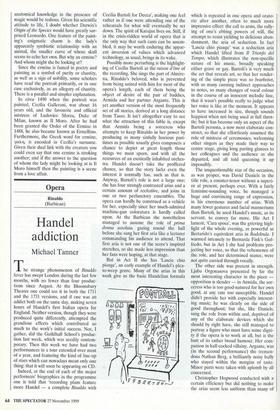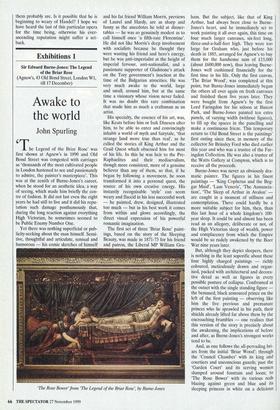Opera
Rinaldo (Barbican)
Handel addiction
Michael Tanner
The strange phenomenon of Rinaldo fever has swept London during the last few months, with no fewer than four produc- tions since August. At the Bloomsbury Theatre one could see it in both the 1711 and the 1731 versions, and if one was an addict both on the same day, making seven hours of Handel's first Italian opera for England. Neither version, though they were produced quite differently, attempted the grandiose effects which contributed so much to the work's initial success. Nor, I gather, did the Guildhall School's produc- tion last week, which was seedily contem- porary. Then this week we have had two performances in a tour extended over most of a year, and featuring the kind of line-up of stars which can nowadays mean only one thing: that it will soon be appearing on CD.
Indeed, at the end of each of the major performers' biographies in the programme one is told that 'recording plans feature more Handel — a complete Rinaldo with
Cecilia Bartoli for Decca', making one feel rather as if one were attending one of the rehearsals for what will eventually be set down. The spirit of Karajan lives on. Still, if in the crisis-ridden world of opera that is the only way that such casts can be assem- bled, it may be worth enduring the appar- ent inversion of values which advanced technology, as usual, brings in its wake.
Possibly more perturbing is the highlight- ing of Cecilia Bartoli as the raison d'être of the recording. She sings the part of Almire- na, Rinaldo's beloved, who is prevented from being united with him for most of the opera's length, each of them being the object of desire of the pair of baddies, Armida and her partner Argante. This is yet another version of the most frequently set of all stories, derived at a long distance from Tasso. It isn't altogether easy to see what the attraction of this fable is, except that Armida being a sorceress who attempts to keep Rinaldo in her power by producing as many sinfully luscious past- times as possible usually gives composers a chance to depict at great length those things we must spurn, and with all the resources of an exotically inhabited orches- tra. Handel doesn't take the proffered chance, so that the story lacks even the interest it normally has, such as that is. Anyway, Bartoli's role is not a large one; she has four strongly contrasted arias and a certain amount of recitative, and joins in one or two perfunctory ensembles. The opera can hardly be construed as a vehicle for her, especially since her much-admired machine-gun coloratura is hardly called upon. At the Barbican she nonetheless managed to assume the role of prima donna assoluta, gazing round the hall before she sang her first aria like a lecturer commanding his audience to attend. That first aria is not one of the score's inspired stretches, so she made less impression than her fans were hoping, at that stage.
But in Act II she has `Lascia chio piange', an early example of Handel's plea- to-weep genre. Many of the arias in this work give us the basic Handelian formula which is repeated in one opera and orato- rio after another, often to much more impressive effect: the call to arms, the rally- ing of one's ebbing powers of will, the attempt to resist yielding to delicious aban- donment, the aria of seduction. In fact `Lascia chio piange' was a seduction aria which Handel lifted from 11 Thonfo del Tempo, which illustrates the non-specific nature of his music, broadly speaking either grave or gay. Bartoli's is very much the art that reveals art, so that her render- ing of the simple piece was so bearbeitet, with so many cunning indirect approaches to notes, so many changes of vocal colour in the course of an innocent melodic line, that it wasn't possible really to judge what her voice is like at the moment. It appears to have increased in size, though sounds happiest when not being used at full throt- tle; but it has become only an aspect of the Bartoli persona, a now most elaborate con- struct, so that she effortlessly assumed the role of mistress of ceremonies, welcoming other singers as they made their way to centre stage, giving long parting glances to her colleagues and the audience as she departed, and all told queening it up impossibly.
The unquestionable star of the occasion, as was proper, was David Daniels in the title role, a counter-tenor without a superi- or at present, perhaps ever. With a fairly feminine-sounding voice, he managed a huge and convincing range of expression, in his enormous number of arias. With many fewer gestures and facial mannerisms than Bartoli, he used Handel's music, as its servant, to convey far more. His Act I lament, 'Cara sposa', was the grieving high- light of the whole evening, as powerful as Bertarido's equivalent aria in Rodelinda. I warmed intensely to Bernarda Fink's Gof- fredo, but in Act I she had problems pro- jecting her voice, so that the vehemence of the role, and her determined stance, were not quite carried through vocally.
The other side was present in strength. Ljuba Orgonasova presented by far the most interesting character in the piece — opposition is slender — in Armida, the sor- ceress who is too good-natured for her own good, at any rate too susceptible. Handel didn't provide her with especially interest- ing music; he was clearly on the side of good throughout; but she, like Daniels, sang the role from within and, deprived of any of the elaborate devices which she should by right have, she still managed to portray a figure who must have some digni- ty if the opera is to work at all, but is the butt of its rather broad humour. Her com- panion in half-cocked villainy, Argante, was (in the second performance) the tremen- dous Nathan Berg, a brilliantly noisy bully who stayed within the margins of taste. Minor parts were taken with aplomb by all concerned.
Christopher Hogwood conducted with a certain efficiency but did nothing to make the arias seem less uniform than many of them probably are. Is it possible that he is beginning to weary of Handel? I hope we have heard the last of this particular opera for the time being, otherwise his ever- ascending reputation might suffer a set- back.



























































































 Previous page
Previous page